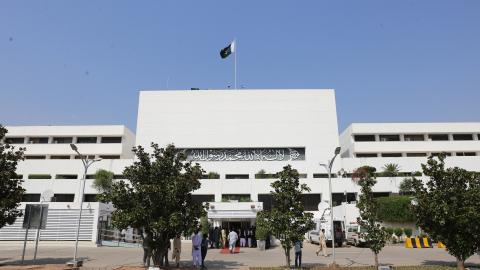Pakistan has often been seen abroad as a crisis-prone country. That reputation has taken on a new life after the April 2022 parliamentary vote of no-confidence, and the unusual events following it, that have polarized the Pakistani nation like never before.
On one side of the divide are those who see the country threatened by a dangerous populist refusing to follow democratic norms. On the other side, fans of a cricket hero who see him as an anti-corruption messiah are removed from office through conspiracies of the elite backed by a hidden external hand.
There is some reason to worry that the ‘Imran Khan or nothing’ approach represents a concerted effort to spread despondency. A sense of dejection has traditionally helped extremists garner support. The rise of fascism in Italy and Spain, and the popularity of Adolf Hitler in Germany, followed similar waves of hopelessness. People faced with economic hardship and a sense of powerlessness are easily swayed by the Utopian promises of populist demagogues.
In most cases, demagogues plunge nations into internal and external conflict. In others, they create circumstances that benefit external enemies. Neither of the two scenarios is a welcome development. It is important, therefore, to deal with the phenomenon of national despair before it undermines the survival of a nation. But this cannot be done just by speeches and statements. Rational assertions fall on deaf ears when they are offered to rebut demagoguery.
People like false promises of redemption just as they enjoy fantasy fiction. In an era of social media and constant screen time, the reality is easily submerged amidst TikTok videos, short clever messages, falsified images on X and Instagram, and easily forwarded WhatsApp and Facebook posts. For people who have much to be upset about in their daily lives, the social media milieu sets the stage for manipulation. People living in echo chambers do not listen to voices of reason from outside their echo chambers.
To Imran Khan’s followers, facts do not matter. They do not read about the relative lack of interest on the part of the United States and the West in Pakistan since the US withdrawal from Afghanistan. It is easier for them to believe the falsehood that their leader was about to create a new global alliance of anti-Western powers and pave the way for an Islamic revival, when he was deposed by the emerging axis between India, Israel, and the United States.
Cult followers also cannot see the absurdity of their fantasy of an Islamic revival backed by Communist China and neo-imperialist Russia. They are unaware of Turkey’s issues with Russia, or its membership in US-led NATO, and still dream of ‘brother’ Recip Tayyip Erdogan pairing up with their Kaptaan in redeeming the honor of the Ummah with Russia on their side.
Part of the reason for the success of populist rhetoric in Pakistan can be found in the national narrative that Pakistanis have been fed for decades under successive civilian and military regimes. Pakistanis have been told that political corruption is the country’s bigger problem, not its dismal literacy rate, insufficient tax collection, low standards of higher education, poor agricultural and industrial productivity, and extreme dependence on external aid and loans.
The nation has generally been blissfully unaware of Pakistan’s international reputation for ideological extremism. Its relative global isolation is attributed to the willingness of ‘dollar khor’ leaders to accept subservience, not to bad policy choices of the past in relation to Jihad and terrorism. An uninformed public is often ready to believe that all it needs is a tough, clean man whose charisma and daily televised speeches will magically solve all of Pakistan’s problems.
Pakistan needs a new national narrative that is based on a realistic appraisal of the country’s history and potential. The old narrative, which is supported by school curricula and years of media repetition, is believed by most salaried Pakistanis, who live in the cities and form the core support base of the current populist challenge. This includes serving and retired military men, civil servants, and professionals (such as doctors and engineers often employed by the government), who mostly live in government housing and send their children to government-subsidized schools.
This discourse portrays Pakistan as a ‘citadel of Islam’, without elaborating what that might actually mean. It assumes that natural resources and productive people should have made Pakistan a wealthy country, which has been impoverished only by corrupt politicians. The salaried class does not understand business, economic policies, or entrepreneurship. It readily believes the bombast that the country’s problems will end once ‘billions of dollars’ of ‘stolen Pakistani wealth’ in overseas accounts is brought back.
The fact that there was no large-scale repatriation of such wealth during the three and a half years in government of their hero does not detract from their belief in the otherwise nice storyline. National meta-narratives often have an element of a good story in them. The problem starts when the story is so removed from reality that it becomes irrelevant to dealing with real-world problems.
Pakistan’s leaders have long described Pakistan as the victim of international conspiracies and the nation has embraced conspiracy theories readily for years. The sense of victimhood has its roots in the way Pakistanis are taught history. ‘Muslims are weak because they were colonized’ is often the mantra, instead of the realization that ‘colonization was made possible because Muslims had become economically and militarily weak’.
For example, the British ability to defeat Nawab of Bengal, Siraj-ud-Daula, and Sultan of Mysore, Tipu Sultan, is framed solely as the function of the two Muslim rulers being betrayed by their allies. There is little discussion of the fact that in the contest between cannon and sword, there was little likelihood of the sword’s victory.

















